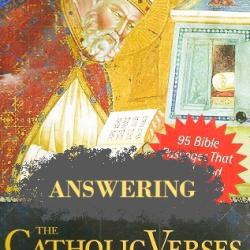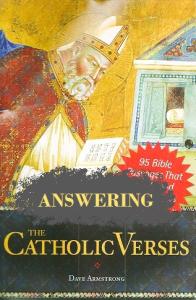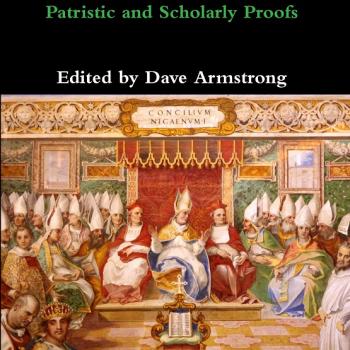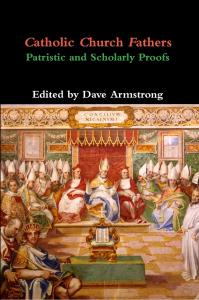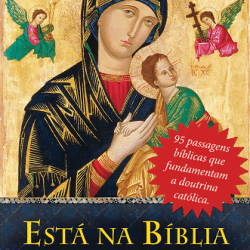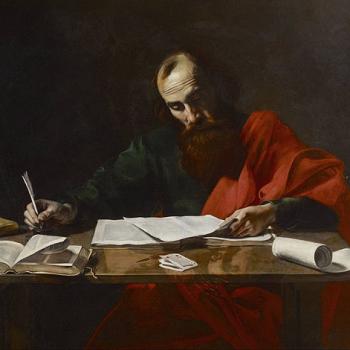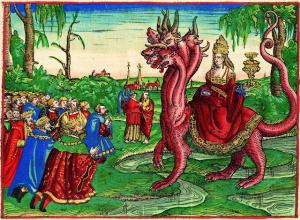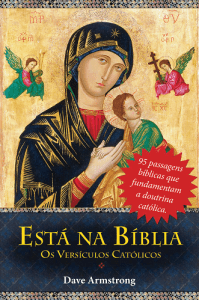
[see book and purchase information]
Francisco Tourinho is a Brazilian Calvinist apologist. He described his theological credentials on my Facebook page:
I have the respect of the academic community for my articles published in peer review magazines, translation of unpublished classical works into Portuguese and also the production of a book in the year 2019 with more than 2000 copies sold (with no marketing). In addition I have higher education in physical education from Piauí State University and theology from the Assemblies of God Biblical Institute, am currently working towards a Masters from Covenant Baptist Theological Seminary, and did post-graduate work at Dom Bosco Catholic University. Also, I am a professor in the Reformed Scholasticism discipline at the Jonathan Edwards Seminary in the postgraduate course in Philosophical Theology. [edited slightly for more flowing English]
My previous replies:
Justification: A Catholic Perspective (vs. Francisco Tourinho) [6-22-22]
Reply to Francisco Tourinho on Justification: Round 2 (Pt. 1) [+ Part 2] [+ Part 3] [7-19-22]
Biblical Justification: vs. Francisco Tourinho (Round 3, Pt. 1) [10-20-22]
Justification: vs. Francisco Tourinho (Round 3, Pt. 2) [8-23-23]
This is an ongoing debate, which we plan to make into a book, both in Portugese and English. I use Google Translate to render his Portugese text into English. Francisco’s words will be in blue. Mine from my previous installment will be in green. I will try very hard to not cite my own past words much, for two reasons: 1) the sake of relative brevity, and 2) because the back-and-forth will be preserved in a more convenient and accessible way in the book (probably with some sort of handy numerical and index system).
In instances where I agree with Francisco, there is no reason to repeat his words again, either. I’ll be responding to Francisco’s current argument and noting if and when he misunderstood or overlooked something I think is important: in which case I’ll sometimes have to cite my past words. I use RSV for all Bible passages (both mine and Francisco’s) unless otherwise indicated.
At this stage of a very long, book-length debate, I’m quite weary of repeated arguments and statements that I have already dealt with. Though it’s said that repetition is a good teacher, repeating a point doesn’t make it any stronger than it was in the first place. I will only deal with “fresh” replies, for the sake of a better final product and the patience of our readers.
His current reply is entitled, Justificação pela fé: perspectiva protestante (contra Armstrong): Rodada 3. Parte 3. [Justification by Faith: Protestant Perspective (Contra Armstrong): Round 3. Part 3.] (8-27-23). Note that he is replying only to Part 3 of my previous Round 2 reply. After I finish this counter-reply, the debate will be completed, by mutual agreement, except for brief closing statements. I get the (rather large) advantage of “having the last word” because Francisco chose the topic and wrote the first installment.
As regards justification beyond the initial instance, I have proven that with my 50 passages having to do with gaining salvation and entrance to heaven (in Part 1): all about works. Heaven and eschatological salvation constitute the ultimate “absolution”: so to speak, and works alongside faith play a key role in that. Moreover, an adult who gets baptized receives forgiveness of sins, regeneration, and justification (many biblical passages on that), or one might say, “absolution” after having decided to undertake the work / action of baptism:
I then provided eleven biblical prooftexts for the related aspect of baptismal regeneration, summarizing that baptism:
A) is a means from God of salvation (1, 2, 9-11)
B) regenerates and justifies us and raises us to a new life, just as Jesus was resurrected (2, 5-7, 10)
C) is God’s instrument to forgive our sins (1, 6)
D) washes away sins; cleanses us from them; thus is a means of sanctification (3)
E) is God’s means of us receiving the indwelling of the Holy Spirit: which no unregenerate person could possess (1, 4, 8, 10-11)
F) brings about inclusion in the rank of saved “souls” (cf. Gal 3:27); membership in the Body of Christ (1, 8 )
G) causes us to be buried with Christ, and raised again [see B above] (5-6)
*
He states that, in adults, the action of wanting baptism is a work that absolves them.
It does so in the case of baptism by desire.
Certainly, in this context employed, the proposition is false. If wanting to be baptized already absolves, then baptism would become unnecessary to cleanse us from sin.
It’s an exception to the rule. Such an exception doesn’t disprove the rule or norm.
Francisco then (again, sadly) chose to not directly address my prooftexts for baptismal regeneration, which is a violation of our agreement to make point-by-point replies (I won’t cite it again). He even chose not to reply to my summary of the passages (seen above, with the lettering):
Mr. Armstrong brought a series of biblical verses that I believe it is redundant to comment them one by one. The comments I have made cover all of them, . . .
Sorry; that won’t do. It’s evading the opponent’s argument: and directly from Holy Scripture at that. Protestants demand biblical proofs, and then when they are provided, Protestants — oddly enough, given their own stated great love for the Bible, supposedly far greater than ours — so often simply ignore them. This is most unimpressive, to put it mildly. Baptism, biblically speaking, simply cannot be separated from the issue of justification. And that fact doesn’t go away when someone refuses to address the relevant inspired biblical passages.
Second: if baptism cleanses, it is also a fact that baptism is not a human work, but only a divine one. Baptism absolves sin without the concurrence of human faith, therefore apart from good works.
This is true only in the case of infant baptism; not adult baptism, which is the model directly referred to (with many examples) in the New Testament.
Francisco cites St. Augustine three times concerning the necessity of baptism for infants (from Against Julian). Augustine, however, took an excessively strict view of infant baptism, which was not followed by the Catholic Church. No Church father is infallible (i.e., they can be wrong on some matters). Protestants certainly agree with that principle. I recently dealt with this in reply to Francisco and a friend, in my article, Fate of Unbaptized Infants, Dogma, & Infallibility (8-11-23). St. Thomas Aquinas (Summa theologiae III q. 64 a. 7), on the other hand, wrote that “God did not bind His power to the sacraments, so as to be unable to bestow the sacramental effect without conferring the sacrament . . .”
Accordingly, the Catechism of the Catholic Church states (#1257, first two instances are my italics; the third instance was in the original): “Baptism is necessary for salvation for those to whom the Gospel has been proclaimed and who have had the possibility of asking for this sacrament. . . . God has bound salvation to the sacrament of Baptism, but he himself is not bound by his sacraments.”
Now, [if?] it is a fact that baptism saves a child regardless of any good work the child has done, why is it so difficult for a Roman Catholic to understand justification by faith alone without mention of any good work as the cause of salvation, when you are readily open to accepting baptism that saves without any good works?
Again, we agree that initial justification is salvific, but after the age of reason a man cooperates in justification / sanctification. An adult convert who agrees to get baptized is performing a work by consenting. Whether baptism is a work or not, the Bible says it is required for regeneration and justification, and provides many additional gifts and blessings.
But my opponent won’t address the relevant verses. Why not? is my question to him, and to our readers. If someone wants to be a Bible person and be guided by Holy Scripture, they shouldn’t be scared of it, or scared to exegete any part of it. I say, “the more Bible the better.” It all supports the Catholic position, so I, for one, am not scared of the Bible at all. I want to immerse myself in it; soak my thought in it. That can only be a good thing.
In that same dispute, I put the following argument:
But I continue: I tell you that this man went down to his house justified rather than the other. For everyone who exalts himself will be humbled; but he who humbles himself will be exalted. Luke 18:14 We see the publican coming down already justified, and the Pharisee thinking he could justify himself by his own works, without succeeding.
Mr. Armstrong said that this text deals with initial justification. I disagree with this approach, because the initial justification is the beginning of the justification, therefore, it is not the whole justification. The distinction between early and later justification is only didactic, so that if St. Luke says that the publican went down justified, then he was not only initially justified, but fully justified.
That doesn’t follow. Simply saying he was “justified” doesn’t mean that it was for all time, and could not be lost. Many biblical texts show that it can be lost, and that it is an ongoing process. So they have to be dealt with.
Francisco did at least, however, decide to bless us with a direct response to seven verses I produced that “tie[d] in sanctification with justification and/or salvation”:
Acts 26:18 to open their eyes, that they may turn from darkness to light and from the power of Satan to God, that they may receive forgiveness of sins and a place among those who are sanctified by faith in me. [Phillips: “made holy by their faith in me”]
There is a relationship between justification and sanctification, obviously, I’ve never denied that, that’s not the point, but if sanctification through good works justifies us, the text doesn’t even address that.
Well, it does, in stating, “sanctified by faith” — since Protestants claim that we are justified by faith. Thus, it ties sanctification and forgiveness of sins, through faith, together in a way that is consistent with infused justification, not imparted, extrinsic justification. But as so often, Francisco only provides a cursory, inadequate response to the “Catholic” implications raised by the text. It’s almost as if he is reluctant to do comparative exegesis.
Romans 6:22 But now that you have been set free from sin and have become slaves of God, the return you get is sanctification and its end, eternal life.
I don’t know what this text proves.
Francisco appears unable (or unwilling) to get out of his own Reformed epistemological “bubble” and try to conceptualize a text in the way that others see it (which is what any exegetical debate entails), and to grapple with it accordingly. It’s not complicated. The text directly connects sanctification to eternal life, as its very “end.” This is utterly contrary to Protestant thinking, which makes eternal life contingent on imputed, declared justification, but not sanctification, which in the final analysis is regarded as “optional” in terms of it not having anything directly to do with salvation and attainment of haven. Thus, this is a classic “Catholic verse,” and as is usually the case, the Protestant confronted with it simply refuses to engage it and explain it in a way consistent with their own theology.
1 Corinthians 6:11 And such were some of you. But you were washed, you were sanctified, you were justified in the name of the Lord Jesus Christ and in the Spirit of our God.
It seems clear to me that justification is not the same as sanctification in this text, unless the apostle is using some rhetorical device. Is this text, according to Roman Catholic belief, about initial or later justification? Showing that there is a relationship between justification and sanctification does not prove that sanctification is justification.
*
Fernand Prat, S.J., in his two-volume book, The Theology of Saint Paul (Westminster, Maryland: The Newman Bookshop, 1952; translated from the 11th French edition by John L. Stoddard) comments on this verse as follows:
Justification is . . . an act which confers the supernatural life. It alternates with regeneration and renewal by the Holy Spirit, which are the fruit of baptism [Titus 3:5-7]. The Holy Spirit is a “Spirit of life” [Rom 8:2], . . .
*
[W]e can very well establish a difference in definition and concept between justification and sanctification, but we cannot separate them, nor consider as separated these two inseparable things. . . .
*
Now this new man is “created according to God in justice and sanctification” [Eph 4:24: “put on the new nature, created after the likeness of God in true righteousness and holiness”]. Justice and sanctity, therefore, are two equivalent notions; so much so, that St Paul does not fear to reverse the order, and to say that Christ has become for us “sanctification, justice, and redemption” [1 Cor 1:30: “our wisdom, our righteousness and sanctification and redemption”; . ..
*
The unique moment of baptismal regeneration brings at the same time purification, sanctification, and justification [1 Cor 6:11], and this concluding gift is mentioned last to show that it is not merely a means of access to and, as it were, the vestibule of, the other two.
*
[Footnote: In regard to this text, Liddon [
Anglican], with the approval of Sanday [
Anglican] (
The Epistle to the Romans, 1898, p. 38), writes that justification and sanctification can be distinguished by the scholar, as the arterial and the nervous systems are distinguished in the human body, but that in the living soul these are coincident and inseparable things.] (Vol. 1, 171-172)
*
It is in vain that excessively subtle exegetes labour to find a gradation in these three effects of the sacramental grace. It does not exist; but by placing sanctification between the other two fruits of baptism, St Paul shows that it is not posterior to them. (Vol. 2, 251)
The document Lumen Gentium from Vatican II stated:
The followers of Christ, called by God not in virtue of their works but by his design and grace, and justified in the Lord Jesus, have been made sons of God in baptism, the sacrament of faith, and partakers of the divine nature, and so are truly sanctified. They must therefore hold on to and perfect in their lives that sanctification which they have received from God. (40)
2 Thessalonians 2:13 . . . God chose you from the beginning to be saved, through sanctification by the Spirit and belief in the truth.
In the next verse the apostle continues: “For which he called you by our gospel, to obtain the glory of our Lord Jesus Christ.”
*
That doesn’t overcome my point in citing 2:13. If one is saved “through sanctification,” obviously it can’t be separated from salvation.
*
The text shows that God elects, calls us to be saved through sanctification, that is, sanctification is a subordinate means of salvation.
*
The text doesn’t claim that it is “subordinate”; it simply states that we’re “saved, through sanctification.” It couldn’t be any more clear than it is. Yet Francisco attempts to wiggle out of the clear implications.
*
We were called to be saints, we were called to good works: “For we are His workmanship, created in Christ Jesus for good works, which God prepared beforehand that we should walk in them” Eph 2.10, not as causes of salvation, but as a consequence of it, for before we are “created in Christ Jesus,” that is, born again, regenerated, saved, to bring forth good fruit.
*
Initial justification and baptismal regeneration transform us and brings about good works, which are then part of our process of salvation, which they must be if we are “saved, through sanctification” and if “eternal life” is the “end” of “sanctification” (Rom 6:22). All of these related passages have to be incorporated into an understanding of the scriptural meaning and nature and end of sanctification. Merely repeating Ephesians 2:8-10 endlessly doesn’t solve the Protestant’s dilemma, which is highlighted by these passages that I brought to the table for discussion.
*
After such an encouraging trend of making some sort of reply (however weak) to four of my prooftexts, Francisco then reverts to his increasingly common tactic of ignoring the last three (violating our agreement to not pick-and-choose what we would reply to), by writing:
*
I don’t know what these texts prove.
*
Here they are:
Hebrews 10:10 And by that will we have been sanctified through the offering of the body of Jesus Christ once for all.
Hebrews 10:14 For by a single offering he has perfected for all time those who are sanctified.
Hebrews 13:12 So Jesus also suffered outside the gate in order to sanctify the people through his own blood.
Of course what they all show (rather dramatically and definitively) is that sanctification is inextricably and organically connected to justification.
*
Pay close attention to the next point of contention. Notice how Mr. Armstrong simply did not respond to my argument.
*
He misses the high irony of just having ignored three of my relevant Bible verses and then accusing me of supposedly doing the same sort of thing. But it’s apples and oranges. I didn’t respond because he was repeating himself again, and because I had already answered what he stated at this point, many times. He was simply doing the tired, timeworn, tedious, ultra-familiar “Reformed talking points / playbook rhetoric and polemics and slogans” schtick. I refuse to repeat my answers to what has already been dealt with. There is no point, and it bores readers, insults their intelligence, and taxes their patience. Hence I wrote:
*
We seem to be going round and round by this point. Again, Catholics agree as to initial justification. After that, we must cooperate with God and perform meritorious good works. The 50 passages about judgment prove that. Paul’s exhortations to persevere and stand firm and to be vigilant show that it’s not a certainty or assured thing that we are saved. We must “press on” as he did.
*
He did choose to respond to the above response:
*
He says that the following texts deal only with an initial justification, let’s see:
Luke 18:14 [his translation] I tell you, this man went down to his house justified rather than the other. For everyone who exalts himself will be humbled; but he who humbles himself will be exalted.
Initial justification can be described as being “justified” just as we say of someone who got their license to drive a car for the first time: “she got her license.” But it has to be renewed (every four years in the US). So we “get” it more than once. We can also lose it due to drunk driving or excessive traffic violations (breaking of the law being similar to sins), and get it back again. In a past installment I wrote about the Bible’s teaching that Abraham was justified more than once.
Romans 6:6-8 Knowing this, that our old man was crucified with him, that the body of sin might be done away with, that we should no longer serve sin. Because he who is dead is freed from sin. Now if we died with Christ, we believe that we will also live with him;
That’s picture-perfect initial justification: from death to life.
Romans 8:10 [his translation] But if Christ is in you, the body is dead because of sin, but the spirit lives because of righteousness.
This refers primarily to initial justification. The larger passage, however, refers to an ongoing nature of justification/sanctification, since Paul writes — in a remarkably unProtestant verse — that we will only be “fellow heirs with Christ, provided we suffer with him in order that we may also be glorified with him” (Rom 8:17). He goes on to talk about actual suffering in this life, in verses 18-23. He’s not merely referring to the “death” that we undergo in baptism (Rom 6:3-4).
Romans 5:19 [his translation] By the obedience of Christ we are made righteous
This doesn’t work for Francisco’s purposes. Romans 5:17-19 is about original sin, and then a parallel is made. I wrote about it in my 1996 book, A Biblical Defense of Catholicism:
It seems unlikely, in light of the clear parallelism in verse 19 (“made sinners . . . made righteous”) that the righteousness is merely imputed, since all agree that original sin is actual. Likewise, verse 17 gives us a clue as to St. Paul’s meaning, since it refers to a received “abundance of grace” and “the gift of righteousness” — phrases which are more in line with infused justification. (p. 46)
I noted in my article,
Banzoli’s 45 “Faith Alone” Passages; My 200 Biblical Disproofs, that Paul wrote about “justification by faith / belief without
denying the place of good works in the overall equation” five times in his epistle to the Romans (3:26, 30; 4:16; 5:1-2, 9). The same paper noted how he referred to “initial justification” seven times in the book (six of them from Romans 4: 4:3-4, 7; 4:5, 6, 9, 11-12, 22-24; 10:9-10). Moreover, Paul referred to “justification by grace alone / rejection of salvation by works (Pelagianism)” in Romans 3:22-24 and 11:6, and “justification by faith rather than law” (Rom 3:11; 4:13; 9:30-32).
*
Paul refers to justification in part by works in Romans 1:17 and 4:2. St. Paul mentions working together with God (synergism: 8:28) and working to save ourselves (8:13) and working to save others (11:14; 15:17-18). He refers to “faith and works / “obedience” of faith / keeping the commandments” many times, too (1:5; 3:31; 6:17; 10:16; 14:23; 16:26), and baptismal regeneration (6:3-4). Paul is extremely Catholic; a quintessential Catholic.
*
It makes no sense at all that texts dealing with a completed work only refer to the beginning of a work. The texts say that these men went down justified, were not partially justified, or began to justify themselves before God, no! The text is clear that he who died is justified, that is, he who is in Christ, dies with Christ, is justified. I do not deny that there is a sanctification, but that sanctification does not justify.
*
My arguments above are strong, in my opinion.
*
Second, Mr. Armstrong is simply silent on the main argument that has been made, the fact that Christ is in us, as Romans 8:10 says. If Christ is in us, all his merits, all his righteousness are in us. Mr Armstrong simply says that he does not deny this, but says that it forms only part of the beginning of justification. This does not proceed, for if it would mean that Christ would only be in us at the beginning of our justification, but this is not true, Christ is in us from now until eternity.
*
Yes, He is in us (praise God) as long as we remain true to Him. But if we gravely sin (mortal sin: 1 Jn 5:16-17), we can separate ourselves from God. Several Bible passages teach this. 1 Samuel 11:6 states that “the Spirit of God came upon Saul” (KJV), but in 18:12 it also notes that “the LORD . . . was departed from Saul” (KJV). Hebrews 3:12 refers to “departing from the living God” (KJV). One can’t “depart” from God if they were never ever with Him. 3:14 states that “we are made partakers of Christ” but there is a condition: “if we hold the beginning of our confidence stedfast unto the end” (KJV). Hebrews 6:4 refers to “partakers of the Holy Ghost” but also teaches that they can “fall away” (6:6, KJV; RSV: “commit apostasy”). We must follow biblical truth wherever it leads. I consistently offer far more biblical evidence for Catholicism than Francisco ever does for Calvinism.
*
Let’s go back to the text of Romans 6.6-8: “Because he who is dead is freed from sin.” [his translation] Now if we died with Christ, we believe that we will also live with him; The text says that whoever dies with Christ is justified, note well, he is not initially justified, but he is justified. Dying with Christ is equivalent to the act of conversion, and whoever is converted is also justified:
*
Again, it can be referred to the same way. If I say, “Joe was a visitor at the Grand Canyon in Arizona in 1965” there is no logical or grammatical exclusion of later possible visits. He was a “visitor” as of 1965. He may or may not have been a visitor at later dates. Likewise, I can say, “I was a visitor at the Grand Canyon in 1977.” That remains true even when I note that I visited it again (as I actually did) in 1978, 2006, and 2019. Analogously, the word “justified” by itself doesn’t rule out losing said justification or regaining it back later. All of that has to be determined by taking into account all of the relevant passages. Francisco’s irrelevant counter-proofs of Galatians 2:20 and 2 Corinthians 5:19 do not overcome what I have just shown.
*
After this point of contention, we began to agree on many things; a rare moment, but it can be seen in Mr. Armstrong’s response.
*
That’s good, but doesn’t surprise me at all. I’ve always said that Protestants and Catholics, and specifically, Calvinists and Catholics, have a lot more in common than many on either side realize.
*
In summary: we agree that the texts of Genesis do not present any good work as a justification for Abraham, this is very relevant.
*
But James (2:21-24) does that, and the New Testament (being inspired) is an excellent commentator on the Old Testament. In
my first reply I wrote:
*
James 2:20-26 also refers back to Genesis 15:6, and gives an explicit interpretation of the Old Testament passage, by stating, “and the scripture was fulfilled which says, . . .” (2:23). The previous three verses were all about justification, faith, and works, all tied in together, and this is what James says “fulfilled” Genesis 15:6. The next verse then condemns Protestant soteriology by disagreeing the notion of “faith alone” in the clearest way imaginable.
*
In the midst of these agreements, something caught my attention. Mr Armstrong said that after further reflection he decided to withdraw part of his argument which had been taken from another blog. . . .
*
The honesty of Mr Armstrong is astonishing! Bravo! I welcome the withdrawal of the argument, I will not refer to it from now on.
*
Well, thanks! That was very kind of him to say. I would hope that all apologists (and all people whatsoever) would have the honesty to admit something they did or argued wrongly, and to retract, apologize, etc., as necessary. I’ve never found it difficult to so, at least in the apologetics sense, because I want to always follow the truth, as best I can determine it.
*
Francisco then cites at length my section where I argue that “both faith and works can bring about justification”. I offer ten Bible passages as proofs of this. I won’t cite them again here, as Francisco already did.
*
Mr Armstrong has made an excellent argument,
*
Thanks!
yet I will show why it fails.
Why am I not surprised?!
Mr. Armstrong makes the connection between Psalms 106:30-31 [he mistakenly had “160”], the text of Genesis 15:6 and several texts from Romans, Galatians and James that deal with justification by imputation. In Mr Armstrong’s mind, if Phinehas, in Psalm 106, had righteousness imputed to him because of his good works, it follows that all texts dealing with imputation must be interpreted equally.
My point was not imputed righteousness, but the fact that works could “reckoned as righteousness” just as faith could be. This is not supposed to happen, according to Protestant theology!
*
But this is not true. The connection that is made with Abraham is fallacious, for in Gen. 15:6 it says, “And he believed in the Lord, and he counted it to him as righteousness.” St. Paul, when dealing with this text, discards any work that Abraham had done to be justified. St. Paul interprets this text as follows:
Romans 4:2-7 [his translation and caps] For if Abraham was justified by works, he has something to boast about, but not before God. ³For what saith the Scripture? ABRAHAM BELIEVED GOD, AND IT WAS COUNTED UNTO HIM FOR RIGHTEOUSNESS. ⁴ Now to him that doeth any work, his reward is not reckoned according to grace, but according to debt. ⁵But to him that worketh not, but believeth on him that justifieth the ungodly, HIS FAITH IS COUNTED AS RIGHTEOUSNESS. ⁶ So also David pronounces blessed the man to whom GOD imputes RIGHTEOUSNESS WITHOUT WORKS, saying, ⁷ Blessed are they whose iniquities are forgiven, And whose sins are covered.”
St. Paul makes it clear that Abraham was not justified by any work, but by faith alone, for “God reckons righteousness apart from works.” St. Paul also takes Abraham’s believing to be synonymous with faith, not works. Therefore, we discard such a connection. . . .
*
Second, and now more important, as far as Rahab and Phinehas are concerned their works are not good works, Rahab lied and Phinehas committed murder.
*
Rahab is included in the roster of the heroes of faith (Heb 11:31). Why? It’s because “she had given friendly welcome to the spies” [in Jericho]. James says that she was “justified by works” because “she received the messengers and sent them out another way” (2:25). But alas, we have Francisco (contra the author of Hebrews and James) to tell us that the inspired revelation of the Bible is wrong about that, and that, in fact, her good works were not good works. “As for me and my house” we will choose biblical teaching rather than Francisco’s, in cases where they conflict. Nothing personal against him!
King David committed murder, too, but it didn’t stop God from making an eternal covenant with him, did it? Moses and Paul committed murder, and Peter denied Jesus. Yet they wrote much of the Bible. The “righteous” work of Phinehas, according to Psalm 106:30, was that he “stood up and interposed, and the plague was stayed.” But Francisco — oddly enough — tells us it wasn’t a good work, so, I guess according to him, we are supposed to disbelieve inspired revelation and follow his counsel where they disagree. No way, Jose! I will never do such a thing!
*
A just execution is not murder, anyway (and Francisco is indeed referring to and misinterpreting Numbers 25:7-8). Because of Phinehas’ good work, reckoned as righteousness, God made a covenant with him and his descendants, too (Num 25:10-13). Abel (Heb 11:4) and Noah (Heb 11:7) are also noted as ones who did works that were reckoned righteous by God.
According to Joshua 2[:3-7], Rahab lied to save the spies:
Then why is she praised in two NT books? Obviously the interpretation of what she did is a positive one. Catholic moral theology explains why. One is not always obliged to tell the truth in absolutely every situation. The classic example is when the Nazis in 1940 in occupied Europe came to someone’s door and asked if they were hiding Jews. If they were, and they lied and said “no” Catholic theology holds that this is not wrong; not a sin, and is praiseworthy. That’s why Rahab is regarded as a hero.
She is also an ancestor of David and is listed in the genealogy of Jesus in Matthew 1:5. She was also the mother of Boaz, who married Ruth. God blessed her offspring (which is how He blessed Abraham). But Francisco says no: she deserves none of that. She is only a prostitute and a liar, in his estimation. We must rip the three positive or neutral references to her out of the New Testament. Not me. I don’t exclude any Bible verses unless they are determined by scholars to not be authentic passages, which case they are not part of the Bible; not inspired and inerrant.
I ask Mr. Armstrong: since when are lying and murder counted among the good works? What is the theological virtue in which they are framed?
And I answer: they’re not, and that what is in question here are neither acts of lying nor of murder, and these act are undeniably commended in the New Testament, and in the Old as well. That’s good enough for me. But Francisco has to get to work and makes his views line up with the Holy Bible (which is always good policy).
It was not the work that justified these men, but their faith alone, for the only thing virtuous in these events was faith, for works such as lying and murder cannot be considered virtuous in themselves to have a justifying power before God.
That’s simply not what the Bible teaches, as shown. Francisco is outrageously eisegeting. Rahab had faith, but what was reckoned to be righteous and praised was what she did (a work). I proved this above. Likewise, with Phinehas. Numbers 25:8 states that “the plague was stayed from the people of Israel” because of his killing of the man and the man (a just work of execution). God then uses that as His reason to make a covenant with him (Num 25:10-13). It can’t possibly be classified as “murder” as a result.
This is terrible, inexplicable reasoning once again, and it borders on blasphemous because of its wanton disregard for plain (and repeated) biblical teaching. He must modify it, in order to hold to an inspired, inerrant revelation, which is what the Bible is. Or maybe Francisco denies its inspiration and inerrancy in parts that he can’t bring himself to agree with? I sure hope not.
Now, if Rahab was justified by lying, then let us all lie a lot that we might all become holier and better men. It doesn’t make any sense.
Mr. Armstrong used several times the distinction between works of law and works of charity, where works of law did not justify, but works of charity did. Considering that Phinehas and Rahab lived in the Old Testament, therefore, in the dispensation of the law, Phinehas specifically, as a priest, was under the law of Moses, I ask: in doing these works, were they fulfilling the law or not fulfilling the law? If they were fulfilling the law, then their works were works of the law, therefore they cannot justify, but if they were works of charity, then we must consider lying and murder as works of charity.
If that’s what he believes, then he needs to tell us all how the Bible can praise her and make her out to be a hero. We can play word games all we like. In the end, the Bible says both were justified by the works they did, and that this was a good thing, not a bad.
Cardinal Newman’s argument quoted by Armstrong makes no sense at all.
Well, that’s a convenient way to get out of grappling with it, isn’t it? But observant readers can and will see through it.
Let’s not stop, because we must directly analyze the text of Psalms 106.30-31 [he again incorrectly lists it as 160]: “So Phinehas arose and intervened, and the plague stopped. And it was counted to him as righteousness from generation to generation forever.”
The work of Phinehas, like that of Rahab, was imputed to them out of justice, but not in consequence of any intrinsic merit of those works, as lying and murder cannot have an intrinsic merit, but owing to the faith which accompanied the act.
That would be moral madness and chaos. The Bible says that these acts were neither lying nor murder. Those words never appear, to my knowledge. There is no such thing as committing immorality, but with faith, so that God is sort of blindsided and renders His approval to murder or lying. I deny the premise!
The faith of these men made God count lying and murder as righteous works, not because of works, which are unrighteous in themselves, but because of faith alone. Lying and murder would have nothing to do with God if it weren’t for the faith of Phinehas and Rahab.
This is so outrageous that one wonders whether it is a self-parody. Could Francisco possibly be making such a morally absurd argument? Apparently so!
If lying and murder have nothing to do with God, neither can they justify us before God, so there is only faith left. . . . Faith made that unrighteous work righteous, no, the inherent righteousness of the work, therefore, righteousness was in faith alone.
Or there is confusion as to definitions and what is going on there in the first place. False Protestant doctrines unfortunately often have that effect on an otherwise cogent, sensible mind.
In other words, the text used as a proof for Roman Catholic doctrine is actually a proof for Protestant doctrine, for a work that is not righteous in itself, such as murder and lying, is declared righteous by God.
Yeah, that’s Protestant doctrine alright. How sad.
Likewise we see the zeal of Elijah in killing the prophets of Baal (1 Kings 18; 19:10, 14)
There is not the slightest hint in the text that God would have disapproved of this act.
and Mattathias in resisting the pagan reforms of Antiochus Epiphanes (1 Macc 2).
What he did was described as “righteous anger” (1 Macc 2:24) and also as follows:
1 Maccabees 2:48 They rescued the law out of the hands of the Gentiles and kings, and they never let the sinner gain the upper hand.
Again, I can find not the slightest hint that what he did was wrong. The Bible says that “all Israel mourned for him with great lamentation” (2:69). Francisco is whistling in the dark. That’s about the most charitable spin I can use to describe it.
It is important to note that Abraham lost faith in Genesis 16, and his wife even laughs at God in Genesis 18, which brings us to the need for a test of faith before men in Genesis 22.
I don’t see that Abraham “lost faith” in Genesis 16. It was permitted for a concubine to bear a child in cases of infertility. Again, I see no hint of divine disapproval here, either. Did I miss something? The willingness to sacrifice his son Isaac wasn’t “before men,” but before God. The angel of the LORD, speaking for God, or as God (both occur in Scripture) said about it: “now I know that you fear God” (Gen 22:12). No one else was around. If this was a way to impress men, it was pretty ineffective: alone on a mountaintop.
Francisco takes on St. Cardinal Newman (my long quote from him about justification from 1838):
Certainly, it does no good for Cardinal Newman to be a Protestant and defend Roman Catholicism.
Truth is truth. Newman had a lot of it in 1838; he had much more after 1845 when he became a Catholic.
The prodigal son (Luke 15:11-32), even though he lost faith, never stopped being a son. The lost sheep (Luke 15.1-7) never stopped being a sheep, it is called a sheep, even when it is lost. Nor did the lost drachma lose its value when it was lost, but great was the joy when the owner found it (Luke 15.8-10). Before men a person can be lost, but before God it is impossible to lose the one he chose to be saved, for “those whom he predestined, these he also called; and whom he called, these he also justified; and whom he justified, these he also glorified.” Romans 8.30.
The actual elect can’t be lost. No one disagrees with that. Our problem is that we can’t be sure (from our fallible and limited human perspective) who is among the elect, and John Calvin agreed that we can’t know that. A person who was saved and then fell away obviously wasn’t one of the elect, by definition. Again, we don’t know the future and don’t know who will fall away. Only God knows.
If Abraham lost faith at some point, . . .
Where does it say in the Bible that he did so? And if it doesn’t, where does this notion come from?
Well, if faith is an act of righteousness, then faith itself becomes a work, against all biblical theology that says that if it is by faith, it is no longer by works.
Initial faith or justification is not a work at all because it is monergistic, with God alone acting. I’ve gone through the other stuff many times. Thank you, readers, for your longsuffering and patience.
I emphasize that I never denied the importance of good works.
We know that Protestants encourage good works, understood in their sense of sanctification (ultimately separate from salvation). That’s not the issue, because both parties (rightly understood) agree that far.
Bede himself explains that the big problem is antinomianism, that is, believing that we can live a depraved life supported by our belief in the name of Jesus, he says:
“Although the Apostle Paul preached that we are justified by faith without works, those who understand by this that it does not matter whether they live evil lives or do evil and terrible things, as long as they believe in Christ, because salvation is through faith, have committed a big mistake. James here expounds how Paul’s words are to be understood. That’s why he uses the example of Abraham, whom Paul also used as an example of faith, to show that the patriarch also performed good works in light of his faith. Therefore, it is wrong to interpret Paul in such a way as to suggest that it did not matter whether Abraham put his faith into practice or not. What Paul meant was that no one obtains the gift of justification based on merit derived from previously performed works, because the gift of justification comes from faith alone.” (On the Epistle of St. James)
The Venerable Bede also wrote:
You must be pure and chaste in your minds, waiting for the Lord to come, for if someone is unable to please God now, it is certain that he will not receive the reward promised to the righteous when Christ comes again. (On 1 Peter)
This is infused justification and merit: both Catholic notions, and rejected by Protestants.
Francisco then makes many responses that are essentially repetitions of prior discussions in this very long debate. I am happy to let him have the last word with these, since very little is new. Therefore, I need not reply, having already done so.
Cardinal Newman’s statements show how totally unaware Roman Catholics are of the significance of Christ’s work on the cross, as they seek self-righteousness when all our righteousness is in Christ.
This statement is its own refutation, and it sadly displays an anti-Catholic attitude that Francisco has avoided for the most part. In fact, St. Cardinal Newman stated (in one of my several citations of him):
[B]y Christ’s righteousness we are made righteous; made, not accounted merely. . . . In the original Greek the word means not merely made, but brought into a state of righteousness. . . . When, then, St. Paul says that we “become righteous” by Christ’s obedience, he is speaking of our actual state through Christ, of that internal nature, frame, or character, which Christ gives us, . . . Christ’s righteousness, which is given us, makes us righteous . . .
Francisco basically ignores almost all of the rich, in-depth arguments made by Cardinal Newman that I presented. Therefore, I am not obliged to interact with his mere summary statements and reiteration for the umpteenth time of Reformed talking-points. At length he came up with something new and fresh:
It must be remembered that this earthly perfection can remain with diverse desires and imperfections. It is said of Asa that his “heart was perfect with God all his days” (1 Kings 15:14), and yet “he did not pull down the altars” (2 Chronicles 15:17), and being sick in his feet, “he put his trust in the physicians and not in the Lord” (2 Chronicles 16:12).
Absolutely correct, as I have been saying.
If we can be just and perfect with imperfections and errors, it follows that perfection and justification are imputative, not transformative, for no one would be called perfect and wholly just if he had any imperfection in him. . . . this perfection does not mean a transformation, but if it can be called perfect and just to the detriment of having errors and imperfections, the only possible alternative is that this perfection and justice are imputed, not transformative.
That doesn’t follow. All it proves is that we remain sinners, who struggle with concupiscence, and who fail to fully follow God’s commands and Jesus’ royal command: to love others as He loved us. None of this proves imputation. Rather, it demonstrates that it’s a process of transformation, not fully accomplished until the next life, where most of us will have to have our remaining sins removed in purgatory. 1 John notes the ideal of perfection in Christ, but at the same time notes that when we fall (which he assumes as a given), and confess and repent, God will graciously forgive and restore us.
We see Job’s own case, cited by the cardinal, who says that Job was “perfect and upright”, as an example of transformative justification, but forgets that Job himself said about himself:
“Indeed, I know it to be so; for how can man be right with God?” (Job 9.2).
“To him, even if I were just, I would not answer him; before, I would ask my Judge for mercy ′′ (Job 9.15).
“What is man, that he should be pure? And what is born of a woman, to be fair?” (Job 15.14).
Good point, and Catholics agree.
We can work on other examples cited by the cardinal, he cites the example of Moses saying: ‘Moses was “faithful in all the house of God”. He cites Hebrews 3:5: “Moses was faithful as a servant in all the house of God,”
But he forgets that Moses was left outside the promised city because he transgressed the divine order: “Because ye trespassed against me among the children of Israel, at the waters of Meribah Kadesh, in the wilderness of Zin; for ye did not sanctify me in the midst of the children of Israel.” Deuteronomy 32:51
I’m sure cardinal Newman was aware that God didn’t allow Moses to pass into the Promised land because he disobeyed Him at one point. But nice try . . .
Cardinal Newman cites the prophet Elijah as righteous, but forgets that “Elijah was a fragile person like us.” James 5:17, “subject to the same passions,” i.e. the same imperfections. Just but imperfect, as Luther would say: simul justus et peccator. Roman Catholic theology cannot explain these terms without falling into contradiction. The cardinal cites Zechariah as a righteous man, but forgets that he himself was punished by God for his lack of faith: “Now you will be mute. He will not be able to speak until the day this happens, because he did not believe my words, which will be fulfilled in the right time.” Luke 1.20 The cardinal cites John the Baptist as an example of a just man, but forgets that John doubted what he himself said, that Christ was the Messiah (Luke 7:19), that is, he lacked faith.
Cardinal Newman was discussing whether the word “righteous” in all the instances he brought up was merely in an imparted sense, or whether it was actual, behavioral, infused righteousness. He never made an argument that any of the people he cites were sinless or absolutely perfect. Francisco misses his point, and just sees what he wants to see. So, for example, Newman wrote about merit in 1864, as a Catholic:
[O]f no one, (excepting the Blessed Virgin) are we able to say that he has lived without the commission of sin, nor has any one, (even the Blessed Virgin,) any merit at all in any one of his acts, except by virtue of the covenanted promise of God in Christ, who has condescended to give merit to that which has no merit taken apart from that promise, just as the signature on a Bank note makes a poor bit of paper worth 5 [pounds]. (Letter to John F. Perrin, 9 September 1864)
St. Cardinal Newman wrote about sanctification and this general subject matter in his Sermon 23, “Grounds for Steadfastness in Our Religious Profession,” 19 December 1841, while still an Anglican:
I am not at all denying the use of either of those arguments for religion which are external to us, or of the practice of drawing out our reasons into form; but still so it is, we go by external reasons, before we have, or so far as we have not, inward ones; and we rest upon our logical proofs only when we get perplexed with objections, or are in doubt, or otherwise troubled in mind; or, again, we betake ourselves to the external evidence, or to argumentative processes, not as a matter of personal interest, but from a desire to gaze upon God’s great work more intently, and to adore God’s wisdom more worthily. . . . But still it holds good, that a man’s real reason for attachment to his own religious communion, why he believes it to be true, why he is eager in its defence, why he feels indignant at being invited to abandon it, is not any series of historical or philosophical arguments, not any thing merely beautiful in its system, or supernatural, but what it has done for him and others; his confidence in it as a means by which men may be brought nearer to God, and may become better and happier. . . . it is very difficult to draw out our reasons for our religious convictions, and that on many accounts. It is very painful to a man of devout mind to do so; for it implies, or even involves a steadfast and almost curious gaze at God’s wonder-working presence within and over him, from which he shrinks, as savouring of a high-minded and critical temper. And much more is it painful, not to say impossible, to put these reasons forth in explicit statements, because they are so very personal and private. Yet, as in order to the relief of his own perplexity, a religious man may at times try to ascertain them, so again for the service of others he will try, as best he may, to state them. (Sermons Bearing on Subjects of the Day [1831-1843 / 1869]; London: Longmans, Green, and Co., 1902)
[T]the various examples cited reveal to us people considered righteous and perfect before God, but who fell into sins, that is, they were not perfect.
We totally agree. Much ado about nothing . . .
Roman theology divides Scripture and observes only what suits it. Observe the perfection of the character, without observing the imperfection of the character.
If Catholics supposedly ignore sin, why is it that we require confession for mortal sin and teach that if one fails to do so, his salvation itself is in danger, and he is separated from God and His grace? How does that fit in with this caricature that Francisco attempts to construct? Nothing is more concerned with sin than the Catholic Church. It’s for this reason that we are so often maligned as having all these burdensome “rules” for conduct. It’s precisely because we always have sin and its resolution in mind.
I agree that we already have enough arguments for readers to judge for themselves.
Good! That’s why I am trying to keep this last reply of mine as short as I can, with a minimum of repetition.
[T]he Catholic position is that justification is ongoing, and can be by faith or by faith + works (where works are mentioned as the cause, while assuming the presence of faith also). So the order is irrelevant. As Jimmy Akin argued, in my citation of his work, Abraham was justified in Genesis 12, again in Genesis 15, and in Genesis 22, “by works.” Genesis 12 is really by faith and works together. God told him to leave his home and trust him for the future, and he did so (a work): “So Abram went, as the LORD had told him” (12:4). Then he built two altars to the Lord (good works again): 12:7-8.
We are looking at the St. James’ argument, not Jimmy Akin’s argument. It is a fact that Abraham’s first act of faith is in Gen 12, but Saint James argues based on Gen 15 and Gen 22, and if we want to know what Saint James wants to teach, we must stick to these two texts, because, Saint James being a great connoisseur of the Scriptures, he could very well use Gn 12, but he did not want to do so, therefore, this chapter is irrelevant in this context of debate on the letter of Saint James, since Saint James does not quote it, although it is relevant for a debate that explores the text of Genesis itself, which is not the case. When Saint James cites Abraham’s justifying work, he does not quote Genesis 12, but Gen 22. James could deal with other works, but he decides to deal with the moment when Abraham was going to kill his own son: “Perhaps our father Abraham was not justified by works, when he offered his son Isaac on the altar?” James 2:21
I ask Mr. Armstrong, in what moral or theological virtue does murdering one’s own child fit? None! That work is not inherently good to justify before God, it is declared righteous by faith, rather than being unrighteous in itself.
It wouldn’t be murder if God commanded it. But as it turned out, it wasn’t God’s will. It was a test to see how far Abraham’s faith would extend. Abraham passed with flying colors! God the Father agreed to sacrifice His only Son. Was that “murder” too? Or “suicide,” since Jesus fully complied in laying down His life? Francisco’s moral categories and moral theology are thoroughly confused and unbiblical.
The same applies to Rahab, who Saint James also cites as a liar justified by good works,
James never calls her a liar, nor does anyone else in the Bible, that I can find. If I’m wrong, then Francisco can direct me to a Bible passage which actually states what he does.
but when we look for good works, we see that she was a liar, she had nothing of a good work, that is, it was not a good work in itself, but was declared righteous by the faith of Rahab.
This is untrue, but we’ve been through this discussion already. Francisco is merely repeating himself, as he has so often done in this debate. And as I’ve noted many times: repetition doesn’t make a weak argument any stronger than it was the first time it was expressed.
The two examples, as well as that of Phinehas (a murderer),
More of the same wholesale distortion of what the Bible teaches . . . I know that Protestants routinely ignore large portions of Scripture that contradict their theology, but I am truly surprised to see such a wanton, breathtaking disbelief in or rejection of clear scriptural teachings. This is not consistent with a reverence for Holy Scripture and the God Who inspired it.
Hebrews describes this as “By faith Abraham obeyed when he was called to go out to a place which he was to receive as an inheritance; and he went out, not knowing where he was to go” (11:8), so it was faith and works. Abraham had the faith to believe God (faith), and he obeyed Him (a work). Genesis 15 describes justification by faith, and Genesis 22, justification by works. Both/and.
The syllogism does not follow. Where in the text of Hebrews does it refer to justification and where is it written that it was works that justified Abraham? We cannot extract from the text what is not in it, it is an eisegesis.
It’s strongly implied in context. Hebrews 11 is about the heroes of the faith. Faith is described as leading to men receiving God’s “divine approval” (11:2), which sounds a lot like justification to me. Abel “received approval as righteous” (11:4). According to Francisco, that must be imputed justification; otherwise, he couldn’t be called “righteous.” Yet now he tries to argue that Hebrews 11 has nothing to do with justification. Enoch is described as “having pleased God” (11:5). Noah “became an heir of the righteousness which comes by faith” (11:7).
Then Abraham is mentioned. The overall thought is obviously the same as what came before. Works with regard to Abraham, are mentioned by the text asserting, “By faith Abraham obeyed” (11:8) and “By faith he sojourned in the land of promise . . .” (11:9) and “By faith Abraham . . . offered up Isaac” (11:17). The Bible also refers twice to “the obedience of faith” (Rom 1:5; 16:26) and twice to “work of faith” (1 Thess 1:3; 2 Thess 1:11). Works are always present where true faith exists.
It is the blood of the lamb that justifies, not the size of faith, not the size of works, not your individual efforts, your penances, self-inflicted sufferings, none of that, but only the blood of the lamb that delivers us from all judgment. God didn’t ask who had great faith, who had many works, who was better and who was worse, he simply looked at the blood of the lamb, and the only way we can have the blood of the lamb on us is through faith.
No works at all, huh? Let’s see what Holy Scripture has to say about that:
Matthew 7:19-21 Every tree that does not bear good fruit is cut down and thrown into the fire. Thus you will know them by their fruits. Not every one who says to me, “Lord, Lord,” shall enter the kingdom of heaven, but he who does the will of my Father who is in heaven.
Matthew 16:27 For the Son of man is to come with his angels in the glory of his Father, and then he will repay every man for what he has done.
Matthew 25:20-21 And he who had received the five talents came forward, bringing five talents more, saying, ‘Master, you delivered to me five talents; here I have made five talents more.’ His master said to him, `Well done, good and faithful servant; you have been faithful over a little, I will set you over much; enter into the joy of your master.’
Matthew 25:34-36 Then the King will say to those at his right hand, `Come, O blessed of my Father, inherit the kingdom prepared for you from the foundation of the world; for I was hungry and you gave me food, I was thirsty and you gave me drink, I was a stranger and you welcomed me, I was naked and you clothed me, I was sick and you visited me, I was in prison and you came to me.’
Luke 3:9 (+ Mt 3:10; 7:19) Even now the axe is laid to the root of the trees; every tree therefore that does not bear good fruit is cut down and thrown into the fire.
John 5:28-29 . . . the hour is coming when all who are in the tombs will hear his voice and come forth, those who have done good, to the resurrection of life, and those who have done evil, to the resurrection of judgment.
Romans 2:6-7, 10, 12 For he will render to every man according to his works:[7] To those who by patience in well-doing seek for glory and honour and immortality, he will give eternal life; . . . [10] but glory and honour and peace for every one who does good, the Jew first and also the Greek. . . . [12] All who have sinned without the law will also perish without the law, and all who have sinned under the law will be judged by the law. [13] For it is not the hearers of the law who are righteous before God, but the doers of the law who will be justified.
2 Corinthians 5:10 For we must all appear before the judgment seat of Christ, so that each one may receive good or evil, according to what he has done in the body.
Hebrews 6:7-8 For land which has drunk the rain that often falls upon it, and brings forth vegetation useful to those for whose sake it is cultivated, receives a blessing from God. But if it bears thorns and thistles, it is worthless and near to being cursed; its end is to be burned.
1 Peter 1:17 . . . who judges each one impartially according to his deeds . . .
Revelation 2:5 Remember then from what you have fallen, repent and do the works you did at first. If not, I will come to you and remove your lampstand from its place, unless you repent.
Revelation 2:23 . . . I am he who searches mind and heart, and I will give to each of you as your works deserve.
Revelation 20:12-13 . . . And the dead were judged by what was written in the books, by what they had done. [13] . . . and all were judged by what they had done.
Revelation 22:12 Behold, I am coming soon, bringing my recompense, to repay every one for what he has done.
The Roman Catholic is totally unaware of what this grace is, this rest in the blood of the lamb.
Right. What arrogance; what ignorance! But we must be patient with the ignorant (as less culpable) and those who are slow to understand. So I carry on.
they do not believe that only a drop of the blood of Christ frees us from all guilt.
If we are free from all guilt as a result of one act of justification for all time, why is it that the following passage is in the Bible?:
1 John 1:8-9 If we say we have no sin, we deceive ourselves, and the truth is not in us. [9] If we confess our sins, he is faithful and just, and will [i.e., in the future] forgive our sins and cleanse us from all unrighteousness. (cf. 2:1-2)
John, in the verse immediately preceding, had just written that “the blood of Jesus his Son cleanses us from all sin.” Yes, of course it does, but we have to learn how this forgiveness is appropriated to us. John explains it in the next two verses. It’s an ongoing process, precisely as Catholicism also teaches, in harmony with Holy Scripture.
The text [Heb 11:31] cites the work as a consequence of faith, not as a source of justification.
I was commenting under James 2:24-25, where it does indeed say that. I referred to when the “Bible” (as opposed to only the book of Hebrews) described Rahab’s justification, and mentions works. And so it does.
Francisco brings up the “works of the law” issue again (which involves the New Perspective on Paul). I’ve already explained that. Briefly, though: Romans 2:13 doesn’t involve Paul’s specific use of the phrase “works of the law,” so there is no contradiction whatsoever between this text and James 2:21, in the Catholic understanding.
Mr Armstrong misinterpreted what I said. He did not say that the two events are the same, but that the first text in which justification by faith is mentioned is in Genesis 15. It is one thing when it occurred, another is when the term appears in Scripture.
Whether Paul uses the term justification for Genesis 12 or not, does not determine what is being described in Genesis 12. This is an important factor to consider. Francisco uses an argument from silence, which never holds any water. The argument about Abraham and justification is a deductive one, incorporating systematic theology. It doesn’t only look for the words, “justification” or “justified.” As Francisco well knows, the word “Trinity” isn’t in the Bible, either. It doesn’t follow that the doctrine is absent.
So, getting past these irrelevancies and minutiae about words, what does Genesis 12 teach about Abraham’s justification? Well, God says to him, “I will make of you a great nation, and I will bless you, and make your name great . . . by you all the families of the earth shall bless themselves” (12:2-3). Does Francisco wish to argue that God said all this about and to an unregenerate, unjustified, “totally depraved” heathen? That makes no sense. Jimmy Akin wrote in 1996 concerning Genesis 12:
Every Protestant will passionately agree that the subject of Hebrews 11 is saving faith—the kind that pleases God and wins his approval (Heb. 11:2, 6)—so we know that Abraham had saving faith according to Hebrews 11. But when did he have this faith? The passage tells us: Abraham had it “when he was called to go out to a place which he was to receive . . . ” The problem for the once-for-all view of justification is that is that the call of Abraham to leave Haran is recorded in Genesis 12:1-4—three chapters before he is justified in 15:6. We therefore know that Abraham was justified well before (in fact, years before) he was justified in Gen. 15:6. But if Abraham had saving faith back in Genesis 12, then he was justified back in Genesis 12. Yet Paul clearly tells us that he was also justified in Genesis 15. So justification must be more than just a once-for-all event. Abraham also received justification afterward Gen 15:6, for the book of James tells us [so; James 2:21-23]
What I said was that due to the fact that the term appeared for the first time in Gen 15, this was the text chosen by St. Paul.
Yes, but this has no impact on the dispute at hand, because concepts are present in texts as well as words. The question is whether Genesis 12 describes a justified man who possesses faith or not. I say it clearly does do so. Therefore, Abraham must have been justified by then.
The point is that Jimmy Akin errs in wanting to extract the teachings of Genesis better than the apostle Paul.
He’s simply grappling in a straightforward manner with the texts, and applying logic and common sense to his exegesis, in light of what we can learn from cross-referencing.
By including the text of Genesis 12, apologist Jimmy Akin can broaden the Genesis debate, but he cannot include in the apostle Paul’s exegesis a text that he did not quote, and still draw Pauline conclusions from it.
He didn’t try to. His article wasn’t about Pauline exegesis, but rather, the exegesis of Abrahamic texts in relation to the issue of justification.
Nor does it speak in favor of Mr. Armstrong if scripture reveals several moments of justification in Abraham’s life, because, at no time, works appear as a source of this justification. . . . Mr. Armstrong describes Abraham’s whole life, his travels, trying to demonstrate that works were justifying Abraham, but as is well known, every time the theme of justification comes up, it is only faith, never works. Where, Mr. Armstrong, is the text, not a single text, in the book of Genesis that associates any work with justification?
This is incorrect. In Genesis 12, Abraham was obedient and “went, as the LORD told him” (12:4). That was a good work of obedience, and as a result, God blessed him greatly (12:2-3). Faith is never mentioned in the chapter. I would say that Abraham clearly exercised it when he obeyed God’s instructions. But it seems to me that if the point of the narrative (as Francisco claims) is to highlight faith as opposed to works, it’s odd that Abraham’s work is mentioned and commended, but not his faith.
In Genesis 15:6 Abraham was justified as a result of having “believed the Lord.” Akin believes that, so do I, and so does the Catholic Church. “Justification” doesn’t appear there, but it does in Romans 4, where Paul offers an extensive interpretation of Genesis 15:6. Just as Paul does, so does James offer an authoritative interpretation of the events recorded in Genesis 22. Abraham was in the process of performing another work of obedience (sacrificing his son, per God’s command).
Francisco says “at no time, works appear as a source of this justification”. But the Bible states in context (God speaking through the angel of the LORD), “because you have done this . . . I will indeed bless you, and I will multiply your descendants . . . because you have obeyed my voice” (Gen 22:16-18). Thus, it’s firmly established in Genesis 22 that it was a work of Abraham that brought about God’s renewed covenant with him.
Knowing this, James simply called it what it was:, using different but conceptually equivalent terminology “Was not Abraham our father justified by works, when he offered his son Isaac upon the altar?” (James 2:21). James — take note — doesn’t deny that Abraham also had faith, which was part of his justification as well (2:18, 20, 22-24, 26). We already knew Abraham was justified by a work in Genesis 22 because God rewarded him for something he had “done” and because he “obeyed” him.
Also, God reiterates that works are central to Abraham’s justification (and anyone’s) — without faith or belief being mentioned — in Genesis 18:
Genesis 18:17-19 The LORD said, “Shall I hide from Abraham what I am about to do, [18] seeing that Abraham shall become a great and mighty nation, and all the nations of the earth shall bless themselves by him? [19] No, for I have chosen him, that he may charge his children and his household after him to keep the way of the LORD by doing righteousness and justice; so that the LORD may bring to Abraham what he has promised him.”
God repeats the same sort of thing again, in speaking to Isaac:
Genesis 26:3-5 “Sojourn in this land, and I will be with you, and will bless you; for to you and to your descendants I will give all these lands, and I will fulfil the oath which I swore to Abraham your father. [4] I will multiply your descendants as the stars of heaven, and will give to your descendants all these lands; and by your descendants all the nations of the earth shall bless themselves: [5] because Abraham obeyed my voice and kept my charge, my commandments, my statutes, and my laws.”
It’s interesting that Genesis never mentions the “faith” of Abraham (at least in terms of using that word), even though he is considered the exemplar and “father” of monotheistic faith. But it does mention plenty of his works. Nor does the entire Protestant Old Testament do so. But in the Deuterocanon it states:
1 Maccabees 2:52 Was not Abraham found faithful when tested, and it was reckoned to him as righteousness?
2 Maccabees 1:2 May God do good to you, and may he remember his covenant with Abraham and Isaac and Jacob, his faithful servants.
The great faithfulness of Abraham is predominantly highlighted in the New Testament (Rom 4; Gal 3; Heb 11; Jas 2), which doesn’t ignore the fact that works also played a key role in Abraham’s justification.
But Francisco futilely tries to ignore all this and pretend that it doesn’t exist, with his dismissive remark:
Whenever the term justification appears, it does not appear in conjunction with works. If the works do not appear, neither was it a process, but a didactic resource to teach us how to justify, by faith alone.
Not true at all, as I have just proven beyond all doubt.
Notice how embarrassing it is for Mr. Armstrong to try to find works as a source of justification in the book of Genesis.
Far from being supposedly “embarrassing,” I didn’t have the slightest problem at all finding them, in the two out of three cases where they were central in Abraham’s justification. If there is any embarrassment here, it would be in Francisco’s case, having missed what was clearly there: which was highlighted and identified by yours truly. We all make mistakes and learn all the time. Nothing new there.
But the most important thing is admitting it and modifying our views, when the Bible requires it. It’s when we ignore or reject what we have discovered in the Bible, that the trouble begins, and it only gets worse, the longer we allow it to continue. Francisco now knows more than he did before, and God will hold him accountable for it, particularly because he is teaching and influencing others, as I also am. It’s no small thing. James states, “Let not many of you become teachers, . . . for you know that we who teach shall be judged with greater strictness” (3:1). Every apologist ought to have this verse next to his bed or above his computer, along with 1 Peter 3:15 and Jude 3.
If there are no works, where is the doctrine of Rome?
Good question! I just proved how there were, so the relevant question to be asked is actually, “if there are works involved in justification [and salvation] where is the doctrine of Geneva and Wittenberg and Canterbury?”
At all times there is only faith, this demonstrates Abraham’s path of righteousness, walking from faith to faith, for “the just shall live by faith”, day by day, under the declaration of righteousness of the crucified Christ
This is incorrect as shown. I give Scripture and plausible exegesis; Francisco offers the usual Protestant slogans and talking-points, which amount to traditions of men, when Protestants are wrong about something. I trust our readers to know which approach is more compelling and effective in proving a point and arguing for a position.
Mr. Armstrong, to evade this objection, says that the word “faith” does not appear in Genesis, as if the Apostle Paul had erred in ascribing the act of believing to Abraham’s faith and opposing it to any kind of good work.
Yes, because it isn’t in the passages under consideration. But I also wrote above, regarding Genesis 12: “Faith is never mentioned in the chapter. I would say that Abraham clearly exercised it when he obeyed God’s instructions.” Catholics don’t have to desperately resort to the old “either/or” dichotomous mentality.
It is true that I said that Abraham lost faith,
And he never showed us from Scripture (if I recall correctly) where it says that this happened.
. . . it would be more appropriate to say that Abraham weakened in faith.
Maybe, but where does it say that, either? I’m not impressed by bald statements about something allegedly in the Bible, but not backed up by biblical proofs.
This has nothing to do with concubinage, but with not believing in the divine promise to grant her a son. Not only he, but also Sarah mocked the angel who announced to him the birth of Isaac, the son of old age.
I’m not sure this is necessarily mocking. They simply found it implausible to believe that it could happen to a 100-year-old man and his ninety-year-old wife. It’s a very common response from frail human beings, since miracles are so rare. Something very unusual, is, well, unusual, and we find that funny. When Mary was told by the angel Gabriel that she was pregnant, she naturally asked, “How shall this be, since I have no husband?” (Lk 1:34). That, too, was a very unusual childbirth event, just as it was for Abraham and Sarah.
Moses balked four times in response to God telling him to confront Pharaoh. He said, “Who am I that I should go to Pharaoh . . .? (Ex 3:11). Then he said, “they will not believe me or listen to my voice” (Ex 4:1). After God answered that, too, then Moses tried excuse #3: “I am not eloquent . . . I am slow of speech and of tongue” (Ex 4:10). Then it was excuse / attempted evasion #4: “send, I pray, some other person” (4:13). Then God got angry at him (4:14).
But in Genesis, the text (17:17-21) doesn’t say that God became angry at Abraham, which stands to reason if Abraham was actually mocking God, as Francisco holds. He didn’t get angry at Sarah, either. He simply said, “Is anything too hard for the LORD?” (18:11-15), just as He said to Job and his friends, and (in many ways) to Moses. Even Moses wasn’t mocking God, but was simply afraid to do the momentous thing God told him to do (as virtually anyone would have been). God’s point was “you can do anything with My help and power.”
Hence there was a need of a test, to set forth and testify to the world that Abraham’s faith was alive, that is, a justification before men.
The test wasn’t because of this, I submit. It was simply another level of testing for a man whose faith was heroic and extraordinary, and Abraham passed the test and was rewarded for his being willing to do the inexplicable, heartrending work that God instructed him to do.
Mr. Armstrong failed to respond to a large part of my argument, claiming that he had already done so.
Yes, which is often the case, because my opponent keeps annoyingly repeating himself, and I refuse to subject our readers to tedium and the boredom of needless repetition.
As we will see later, this is not true, because now I will demonstrate that he did not even understand what I argued, not because of lack of intelligence, but because it is an argument and a truth of Scripture totally foreign to the religious experience of the Roman Catholic.
Right. Francisco forgets that I was a very committed evangelical Protestant for thirteen years. I was an apologist then, too (for nine years) and so I am familiar with most of the main outlines of Protestant theology and know the arguments well (not to mention, the past 33 years of debating Protestants). But if he wishes to delude himself by pretending that all of this (including religious experience) is “foreign” to me, no skin off of my back. It only helps my case all the more after I show that this assessment of what I know and have known is incorrect.
Francisco then wants to debate the meaning of 2 Corinthians 5:1: “For our sake he made him to be sin who knew no sin, so that in him we might become the righteousness of God.”
He denied the biblical text by saying that the apostle did not literally say that Christ “was made sin”, and then claim that Christ is without sin in any sense. Now, if it is not in any sense, then the apostle could not have made that statement in any sense, but he did. Blasphemy is the consequence of Roman Catholic teaching, for if they are consistent, they will have to assert that Christ inherently became a sinner, as I will prove below.
The point is that Christ does not become a sinner by infusion, but by declaration. Thus, Christ also became accursed, not inherently, but declaratively: “It was Christ who redeemed us from the curse of the law when he became a curse for us, for as it is written, ‘Cursed is everyone who hangs on a tree. ”. Gal 3.13.
But if Christ was made a sin and a curse, as the texts clearly affirm, it could only have been by imputation of our sins and our curse, never by infusion, since Christ is most holy and cannot be turned into a sinner. Therefore, a sinner is justified before God because the righteousness of Christ is imputed to him. Now, if anyone says that man is justified by infused righteousness, then, for the same reason, he must say that Christ was made sin and accursed by the infusion of sin, and that, yes, is blasphemy. It is a necessary conclusion of Roman Catholic teaching, which, of course, will deny its consequence, but not without loss of coherence.
Or the Catholic teaching about this passage is different altogether from these straw men that Francisco sets up and then pulverizes with misguided confidence. He quotes a bunch of Church fathers to back up his contentions. In some cases they may actually do so. But they’re not part of the Catholic magisterium. Nor do Protestants regard them as infallible and incapable of error. This debate is not on patristics or patrology. So I will pass on interacting with all of that.
As we can see, Mr. Armstrong will have to anathematize a lot of people for blasphemy, but not me, because Reformed theology rests solidly on the great theologians. Christ became sin and accursed without being inherently sinful and accursed, and this situation can only be explained by imputation.
The Roman Catholic must live with this trilemma, between denying the biblical teaching that Christ took our sins upon himself, being declared sinful and accursed (which Mr. Armstrong declared damned and sinful), or fall into the blasphemy of asserting that Christ became a sinner by infusion of sin (which Mr. Armstrong denies).
Two of the three propositions are denied by Mr. Armstrong, therefore, it remains that he must deny, if he is to remain consistent, that justification is by infusion and accept the Biblical teaching that justification is by imputation.
That’s how Francisco concludes his entire portion of the debate. Now I will again cite Fernand Prat, S.J., who will show that our view is “none of the above”; hence, neither myself, nor Catholics as a whole are caught in the jaws of a horrendous internal dilemma, as Francisco vainly imagines:
[T]he whole text awakens, not the idea of substitution, but that of solidarity. For, in order that Jesus may associate us with his death, it is essential that we should be wholly one with him at the moment when he dies for us. No doubt we are associated with the dying Christ only in an ideal way, as our representative, but his death is realized in us mystically through faith and baptism, . . .
By a sublime condescension on the part of God, the Just One becomes sin, in order that sinners may become justice. Here again, there is, properly speaking, no substitution of persons, but solidarity of action. Sin is not transferred from men to Christ, but it proceeds from men to embrace Christ as the representative of human nature, just as the justice of God is not transferred from Christ to men, but proceeds from Christ to embrace men, when the later, by filial adoption, are clothed with the divine nature. This idea is more clearly expressed in the second sentence, for we become the justice of God only in Christ; that is to say, only in so far as we are united with him; but the two parts of the phrase are parallel and are intended mutually to explain each other. . . .
Jesus is neither a sinner nor sin, personally, but as a member of a sinful family, with which he identifies himself. It is in the same sense that he is made a “curse,” like a branch of an accursed tree. Similarly, on account of our union with him who is justice itself, we participate in his “justice.” (Prat, ibid., Vol. 2, 203-205)
Navarre Bible Commentary adds:
According to the rite of atoning sacrifices (cf. Lev 4:24; 5:9; Num 19:9; Mic 6:7; Ps 40:7) the word “sin,” corresponding to the Hebrew ašam, refers to the actual act of sacrifice or to the victim being offered. Therefore, this phrase means “he made him a victim for sin” or “a sacrifice for sin.” It should be remembered that in the Old Testament nothing unclean or blemished could be offered to God; the offering of an unblemished animal obtained God’s pardon for the transgression which one wanted to expiate. Since Jesus was the most perfect of victims offered for us, he made full atonement for all sins. In the Letter to the Hebrews, when comparing Christ’s sacrifice with that of the priests of the Old Testament, it is expressly stated that “every priest stands daily at his service, offering repeatedly the same sacrifices, which can never take away sins. But when Christ had offered for all time a single sacrifice for sins, he sat down at the right hand of God, then to wait until his enemies should be made a stool for his feet. For by a single offering he has perfected for all time those who are sanctified” (Heb 10:11–14).
And Ignatius Catholic Study Bible (Scott Hahn and Curtis Mitch, 2nd edition, San Francisco: Ignatius Press, 2000) observes:
Paul adopts the idiom of the Greek OT, where “sin” is a shorthand expression for a Levitical “sin offering” (Lev 4:21; 5:12; 6:25). Isaiah uses this same language for the suffering Messiah, who was expected to make himself an “offering for sin” (Is 53:10).
I shall conclude by citing St. Thomas Aquinas:
God “made Christ sin”—not, indeed, in such sort that He had sin, but that He made Him a sacrifice for sin: even as it is written (Hos. 4:8): “They shall eat the sins of My people”—they, i.e. the priests, who by the law ate the sacrifices offered for sin. And in that way it is written (Is. 53:6) that “the Lord hath laid on Him the iniquity of us all” (i.e. He gave Him up to be a victim for the sins of all men); or “He made Him sin” (i.e. made Him to have “the likeness of sinful flesh”), as is written (Rom. 8:3), and this on account of the passible and mortal body He assumed. (Summa Theologica 3, q. 15, a. 1, ad 4)
***
Afterword (to be added to the debate when it is published as a book):
I want to offer my heartfelt thanks to Francisco Tourinho for an excellent, in-depth, educational debate, that I think will be helpful to many. He has won my respect in two ways:
1) He conducted himself as a Christian gentleman the whole time, and never denied my sincerity nor my status as a Christian, and he never argued that Catholicism was not a Christian belief-system.
There were no personal attacks, even though prior to the debate we initially got off to a rocky start, for which I bear my share of the blame as well, since I can be too provocative at times.
2) He has been the only Protestant apologist — bar none — who has been willing to go toe-to-toe with me in a debate for three full back-and-forth rounds, since 1995 when I engaged James White.
No other Protestant apologist / critic of Catholicism I have encountered has ever done that. This includes James White, who is widely considered the most able critic of Catholicism, and others such as Jason Engwer, the late Steve Hays, Dr. Eric Svendsen, James Swan, “Turretinfan,” and Brazilian apologist Lucas Banzoli, who made a few replies (with numerous personal insults) and then decided to stop engaging me months ago.
So I highly commend him for having the courage of his convictions (as shown also by the decision to publish this exchange in a book).
And I think he argued about as well as a Protestant can, in defense of their understanding of justification. Obviously, I think I prevailed in the debate (particularly in my copious citation of Holy Scripture), but he made his case well.
I hope we can have many more such cordial dialogues on other topics in the future, and I wish my new friend the very best in all his endeavors.
Addendum
Francisco also offered an Afterword. Unsurprisingly, he also claimed victory in the debate on a couple of fronts, but he was gracious enough to refer to a “productive debate” from which we both “developed intellectually,” and stated that I “debated well” and “positively surprised” him. Moreover, he observed that I “used good arguments on several occasions,” and “confirmed” myself as “an excellent apologist” and that he hopes “to be able to dialogue more often on other subjects.”
***
Practical Matters: Perhaps some of my 4,300+ free online articles (the most comprehensive “one-stop” Catholic apologetics site) or fifty-three books have helped you (by God’s grace) to decide to become Catholic or to return to the Church, or better understand some doctrines and why we believe them.
Or you may believe my work is worthy to support for the purpose of apologetics and evangelism in general. If so, please seriously consider a much-needed financial contribution. I’m always in need of more funds: especially monthly support. “The laborer is worthy of his wages” (1 Tim 5:18, NKJV). 1 December 2021 was my 20th anniversary as a full-time Catholic apologist, and February 2022 marked the 25th anniversary of my blog.
PayPal donations are the easiest: just send to my email address: [email protected]. You’ll see the term “Catholic Used Book Service”, which is my old side-business. To learn about the different methods of contributing, including 100% tax deduction, etc., see my page: About Catholic Apologist Dave Armstrong / Donation Information. Thanks a million from the bottom of my heart!
***
Summary: This is my final reply (3rd round, part 3) in a meaty debate on justification and comparative soteriology, with Brazilian Reformed Presbyterian apologist Francisco Tourinho.






